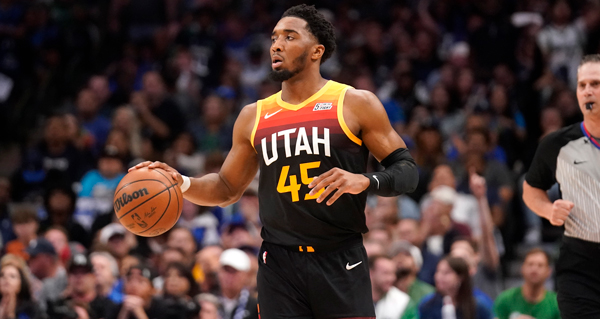In the 2022 playoffs, Donovan Mitchell played defense about as badly as an NBA player can. Dallas Mavericks guards of varying skill levels loved this, as they were able to get into the lane at will, and cause 101-level defensive breakdowns that made for easy passes and open threes. Rudy Gobert, a three-time Defensive Player of The Year, became helpless in this situation, scrambling to cover up mistakes that are too large to actually fix; as the truism goes, any defense is only as good as its weakest member. And Mitchell, with his sub-turnstile presence on the perimeter, was as weak as it gets.
The best possible explanation for this memorably awful effort is also the most plausible one: Mitchell was doing it on purpose. After a season of loud rumors about the dissolution of his and Gobert’s already fraught relationship, the fifth-year All-Star appeared to be done with the all-important task of trying, in Utah. The postseason, whatever your emotional circumstances may be, is a pretty conspicuous place to give up so visibly, but Mitchell’s doing so didn’t seem to negatively impact his trade value just a few months later. The Cleveland Cavaliers, outbidding the New York Knicks, have acquired him, and added his dynamic scoring skills to arguably the best young core in the sport.
Darius Garland, Evan Mobley, and Jarrett Allen led a renaissance in Cleveland last year—before injuries took their momentum apart, the team had one of the very best defenses in the league, and they spent much of the season on a 50-plus win pace. All three were under 24 years of age, and Mobley was merely a rookie. Their ceiling was, and is, mightily high in both the short and long term. They weren’t without weaknesses: Garland was sensational all year, but he was an overburdened ball-handler and creator, and their midseason trade for Caris LeVert was a flawed, partial solution to that problem.
The acquisition of Mitchell is, well, not. Optimized as a score-first guard, the 26-year-old is in a elite air of the talent atmosphere: his peers are Zach LaVine, Jamal Murray, and Devin Booker. Move one tier up, and you’re looking at perennial MVP candidates. Mitchell eases Garland’s perimeter scoring responsibilities, and his gravity at the three-point arc should create space for Allen and Mobley to move more freely as well. There is a balance to be struck, to be sure, between Mitchell and Garland’s usage, and reasonable worries about how much the newest Cav might move the ball and make sure their two elite big man defenders are given the touches they deserve—ask Rudy how he feels about this—but in the abstract, this move could very well make Cleveland one of the best teams in the league. This analysis, though, importantly ignores vibes.
What are vibes, materially speaking? They are the accumulated relationship qualities of an organization or community, and the shape that this addition of bonds takes. For the 2021-22 Cavs, the vibes were so good that they soared from unwatchable curiosity to League Pass regulars. For the 21-22 Jazz, the vibes were so bad that the franchise decided to send out the majority of their rotation—they might still get rid of the rest of it, yet—and start over. That’s not all on Mitchell, because vibes are rarely the work of one person, but he was certainly a major contributor to the gross knot of decayed togetherness and hope that defined their season.
Fresh starts are a hell of a drug, so you can expect Mitchell to be all smiles when he gets to training camp in Cleveland, and for there to be a lengthy grace period on any more reports about his displeasure, if those are to recur. But it would be foolish to believe, during this soon-to-come sanguine period, that there was not a significant risk taken by Cleveland in giving up a lion’s share of their future draft stock to get Mitchell, along with Lauri Markkannen—who, while largely a disappointment throughout his career, provided a jumbo-sized seven-foot presence on the wings that made playing the Cavs that much more of a struggle.
The bet the Cavs have made on Mitchell is that Allen and Mobley are so good on defense that they can get smaller and worse at defending the perimeter, as long as it comes with more scoring. More importantly, they have implied that they believe their young trio, along with head coach J.B. Bickerstaff, have cultivated a vibe so strong that a player who’s demonstrated a tendency toward tantrum will be persuaded to become his best self with their team—not just for those first few glowing months, but for good, as he’s under contract through 2025. It takes a special kind of confidence to see a noisily dissatisfied man, and say to yourself that you can fix him. We’ll see if the Cavs can.



